形容词、副词及其比较等级
形容词和副词的比较等级
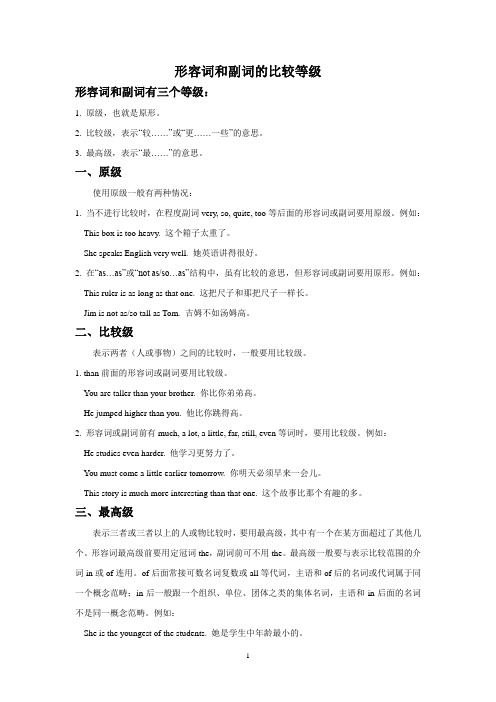
形容词和副词的比较等级形容词和副词有三个等级:1. 原级,也就是原形。
2. 比较级,表示“较……”或“更……一些”的意思。
3. 最高级,表示“最……”的意思。
一、原级使用原级一般有两种情况:1. 当不进行比较时,在程度副词very, so, quite, too等后面的形容词或副词要用原级。
例如:This box is too heavy. 这个箱子太重了。
She speaks English very well. 她英语讲得很好。
2. 在“as…as”或“not as/so…as”结构中,虽有比较的意思,但形容词或副词要用原形。
例如:This ruler is as long as that one. 这把尺子和那把尺子一样长。
Jim is not as/so tall as Tom. 吉姆不如汤姆高。
二、比较级表示两者(人或事物)之间的比较时,一般要用比较级。
1. than前面的形容词或副词要用比较级。
You are taller than your brother. 你比你弟弟高。
He jumped higher than you. 他比你跳得高。
2. 形容词或副词前有much, a lot, a little, far, still, even等词时,要用比较级。
例如:He studies even harder. 他学习更努力了。
You must come a little earlier tomorrow. 你明天必须早来一会儿。
This story is much more interesting than that one. 这个故事比那个有趣的多。
三、最高级表示三者或三者以上的人或物比较时,要用最高级,其中有一个在某方面超过了其他几个。
形容词最高级前要用定冠词the,副词前可不用the。
最高级一般要与表示比较范围的介词in或of连用。
of后面常接可数名词复数或all等代词,主语和of后的名词或代词属于同一个概念范畴;in后一般跟一个组织、单位、团体之类的集体名词,主语和in后面的名词不是同一概念范畴。
英语中形容词副词的比较级和最高级
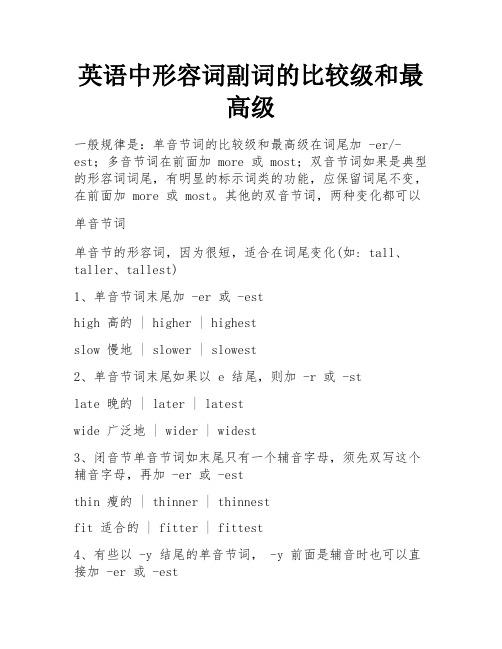
英语中形容词副词的比较级和最高级一般规律是:单音节词的比较级和最高级在词尾加 -er/-est;多音节词在前面加 more 或 most;双音节词如果是典型的形容词词尾,有明显的标示词类的功能,应保留词尾不变,在前面加 more 或 most。
其他的双音节词,两种变化都可以单音节词单音节的形容词,因为很短,适合在词尾变化(如: tall、taller、tallest)1、单音节词末尾加 -er 或 -esthigh 高的 | higher | highestslow 慢地 | slower | slowest2、单音节词末尾如果以 e 结尾,则加 -r 或 -stlate 晚的 | later | latestwide 广泛地 | wider | widest3、闭音节单音节词如末尾只有一个辅音字母,须先双写这个辅音字母,再加 -er 或 -estthin 瘦的 | thinner | thinnestfit 适合的 | fitter | fittest4、有些以 -y 结尾的单音节词, -y 前面是辅音时也可以直接加 -er 或 -estshy 害羞的 | shyer | shyestsly 狡猾的 | slyer | slyestwry 讽刺的 | wryer | wryest多音节词三个音节以上的多音节词已经很长,不适合再加词尾变化,因而在前面加 more 或 most,表示更(最)...,或者加 less 或least ,表示更(最)不...interesting 有趣的 | more interesting | most interestingimportant 重要的 | less important | least importantcarefully 认真地 | more carefully | most carefully双音节词双音节形容词很尴尬:不长不短,怎么判断?1、词尾是典型的形容词词尾,有明显的标示词类的功能,应保留词尾不变,在前面加 more 或 mostcrowded more crowded most crowdedloving more loving most lovinghelpful more helpful most helpfulfamous more famous most famousactive more active most active2、其他的双音节形容词,如果不是典型的形容词字尾,变化则无限制,两种变化都可以often oftener(more often) oftenest(most often)shallow shallower(more shallow) shallowest(most shallow)3、如果是 -y 结尾,这个长母音因为发音上的要求,要先变成短母音的 i,再加字尾变化,如:happy happier happiestlucky luckier luckiest二、不规则形式good/well | better | bestbad/ill/badly | worse | worstmany/much | more | mostlittle | less | leastfar | farther/further | farthest/furthestold | older/elder | oldest/eldest三、比较等级英语中形容词副词有三个比较等级,即原级、比较级和最高级1、原级(1) 表示程度相同,即“和...一样...”时用原级,常用"as... as" 结构It is as beautiful as paradise in Heaven. 这里如天堂般美丽This room is as broad as it is long. 那个房间长宽相等He is as handsome as John (is). 他和约翰一样英俊He studies as hard as John (does). 他和约翰一样努力(2) as...as... 引导的结构可采用倒装句型He studies as hard as John (does). = He studies as hard as does John.He is as handsome as John is. = He is as handsome as is John.(3) 否定的原级用 not as...as 或not so...as,二者区别不大You are not as tall as he. 你没有他高Guangzhou is not as clean as Shanghai. 广州没有上海那么干净I didn't do so well as I should. 我做得不如我应做得那么好(4) as/so... as... 结构前可以用 just、quite、almost、nearly、half 等词在程度上加以修饰This story was quite as interesting as we had thought. 这个故事和我们想的一样精彩The bike is not half so new as mine. 这辆自行车还没我的一半新She can read twice as fast as he does. 她的阅读速度比他快一倍John is not quite as good a student as his sister.连接词 as 表示这是组 as..as 的比较级。
常见形容词副词比较级和最高级
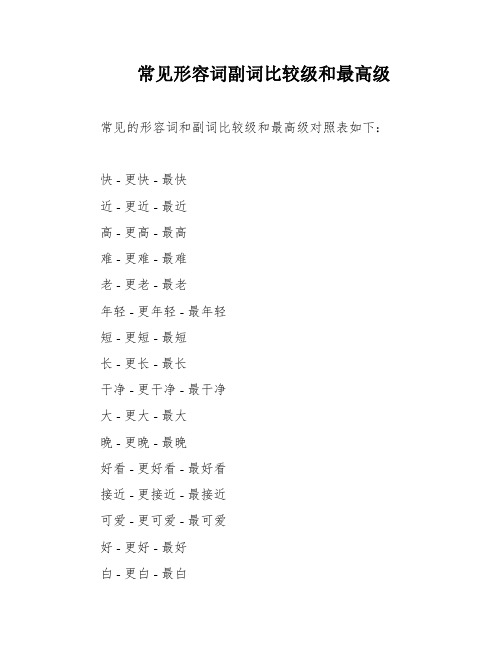
常见形容词副词比较级和最高级
常见的形容词和副词比较级和最高级对照表如下:
快 - 更快 - 最快
近 - 更近 - 最近
高 - 更高 - 最高
难 - 更难 - 最难
老 - 更老 - 最老
年轻 - 更年轻 - 最年轻
短 - 更短 - 最短
长 - 更长 - 最长
干净 - 更干净 - 最干净
大 - 更大 - 最大
晚 - 更晚 - 最晚
好看 - 更好看 - 最好看
接近 - 更接近 - 最接近
可爱 - 更可爱 - 最可爱
好 - 更好 - 最好
白 - 更白 - 最白
大 - 更大 - 最大
热 - 更热 - 最热
瘦 - 更瘦 - 最瘦
忙 - 更忙 - 最忙
早 - 更早 - 最早
容易 - 更容易 - 最容易快乐 - 更快乐 - 最快乐丑 - 更丑 - 最丑
友善 - 更友善 - 最友善美丽 - 更美丽 - 最美丽美味 - 更美味 - 最美味有趣 - 更有趣 - 最有趣耐心 - 更耐心 - 最耐心无聊 - 更无聊 - 最无聊缓慢 - 更缓慢 - 最缓慢可怕 - 更可怕 - 最可怕兴奋 - 更兴奋 - 最兴奋重要 - 更重要 - 最重要危险 - 更危险 - 最危险好 - 更好 - 最好
多 - 更多 - 最多。
形容词副词比较等级1
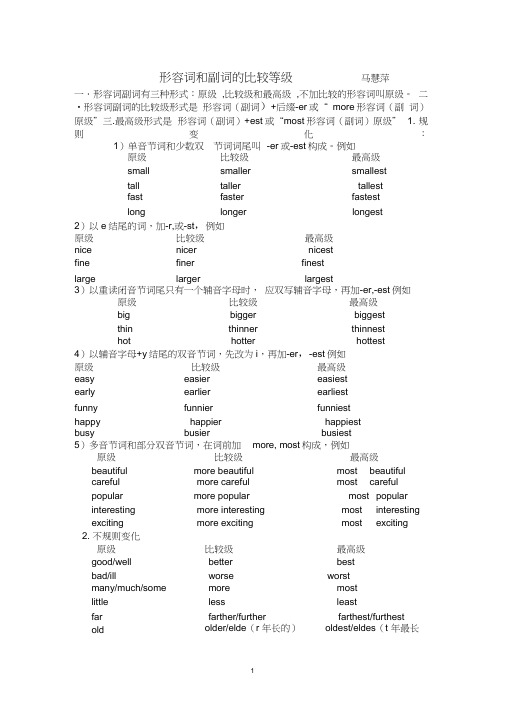
形容词和副词的比较等级马慧萍一.形容词副词有三种形式:原级,比较级和最高级,不加比较的形容词叫原级。
二•形容词副词的比较级形式是形容词(副词)+后缀-er或“ more形容词(副词)原级”三.最高级形式是形容词(副词)+est或“most形容词(副词)原级” 1. 规则变化:1)单音节词和少数双节词词尾叫-er或-est构成。
例如原级比较级最高级small smaller smallesttall taller tallestfast faster fastestlong longer longest2)以e结尾的词,加-r,或-st,例如原级比较级最高级nice nicer nicestfine finer finestlarge larger largest3)以重读闭音节词尾只有一个辅音字母时,应双写辅音字母,再加-er,-est例如原级比较级最高级big bigger biggestthin thinner thinnesthot hotter hottest4)以辅音字母+y结尾的双音节词,先改为i,再加-er,-est例如原级比较级最高级easy easier easiestearly earlier earliestfunny funnier funniesthappy happier happiestbusy busier busiest5)多音节词和部分双音节词,在词前加more, most构成,例如原级比较级最高级beautiful more beautiful most beautifulcareful more careful most carefulpopular more popular most popular interesting more interesting most interesting exciting more exciting most exciting 2. 不规则变化原级比较级最高级good/well better bestbad/ill worse worstmany/much/some more mostlittle less leastfar farther/further farthest/furthestold older/elde(r 年长的)oldest/eldes(t 年最长的四.形容词副词比较级用法:用于两个人或事物的比较,其结构形式如下:主语+谓语(系动词)+比较级+ than + 对比成分。
英语形容词和副词比较级

形容词、副词的比较等级一、形容词和副词比较级1.定义:大多数形容词和副词都有三个等级:原级、比较级和最高级比较级:用于两者(人或事物)之间的比较,说明“前者比后者更……”最高级:用于三者及三者以上(人或事物)之间的比较,其中一个在某方面超过其他几个注意:A.英语中,有些形容词说明形状、材质等,还有一些形容词没有程度可分或本身就表示某种程度,这些形容词没有比较级和最高级,例:round/wooden/golden/right/wrong/first/east。
B.英语中常见的表示“最高程度”的形容词有excellent、extreme、perfect等,它们没有最高级,也没有比较级。
C.此外,英语中有些词和短语不用比较级形式却表示比较级概念,如:minor(较小的)、senior(年长的、高级的)、junior(青少年的)、prior(事先的、优先的)、inferior(次的、低等的)、superior (上级的、更好的)、prefer to(更加喜欢、宁愿)、preferable(更好的、更合适的)2.形容词比较级、最高级规则变化注意:多音节或部分双音节词,也可加less(不如、不像)或least eg. I am less outgoing than my sister. 我不如我的姐姐外向。
3.形容词比较级、最高级不规则变化二、形容词和副词原级的用法1.表示A与B在某一方面相同或不同时,用adj/adv的原级,表示两者在某一方面相同时,用“as+adj/adv原级+as”句型;表示一方在某方面不如另一方时,用“not+as/so+adj/adv原级+as”句型。
eg. I think science is as important as math. 我认为科学和数学一样重要。
It is not as/so warm today as yesterday. 今天不如昨天暖和。
He didn`t write as/so carefully as Tom. 他写得不如Tom认真。
形容词和副词的比较级和最高级

形容词和副词的比较级和最高级大多数形容词和副词有三个等级:1)原级,即原形。
2)比较级,表示“较……”或“更……一些”的意思。
3)最高级,表示“最……”的意思。
1.形容词和副词比较级和最高级的构成(1)规则变化单音节词和少数双音节词一般在词尾加-er或-estcold colder coldeststrong stronger strongestfast faster fastestslow slow slowest以字母e结尾的形容词,加-r或-stnice nicer nicestlarge larger largest重读闭音节词只有一个辅音字母时,应先双写辅音字母,再加-er 或-estbig bigger biggestthin thinner thinnest以“辅音字母+y”结尾的双音节词,先改“y”为“i”,再加-er 或-esteasy esaier easiesthappy happier happiest多音节词和部分双音节词在词前加more或mostdelicious more delicious most deliciousinteresting more interesting most interting【注意】:其中第三条在初中阶段主要有以下几个形容词:big, red, wet, hot, fat, thin, fit。
因此,我们可按其汉语意思记为:大、红、湿、热、胖、瘦、合适。
(2)不规则变化good/well better bestbad/badly worse worstmuch/many more mostlittle less leastfar farther/further farthest/furthest(1)原级的用法①表示程度的副词very, so, too, enough, quite等修饰时用形容词原级The film is too boring. 这部电影太无聊了。
形容词和副词的比较等级

形容词和副词的比较等级形容词和副词有三个比较等级:原级(Positive Degree)、比较级(Comparative Degree)和最高级(Superlative Degree)。
从形式上来说,原级就是形容词或副词本身,那么怎样构成形容词和副词的比较级和最高级呢?1.一般情况下,后面加-er构成其比较级,加-est构成其最高级。
long---longer---longest strong---stronger---strongest2.以不发音的e字母结尾的词,直接加-r构成比较级,加-st构成最高级。
nice---nicer---nicest fine---finer---finest large---larger---largest3.以“辅音字母+y”结尾的词,须先变y为i, 再加-er构成比较级,加-est构成最高级。
heavy---heavier---heaviest pretty---prettier---prettiest4.以由“一个元音字母+一个辅音字母”构成的重读闭音节结尾的词,双写该辅音字母,加-er构成比较级,加-est构成最高级。
big---bigger---biggest thin---thinner---thinnest5.部分双音节词和多音节词前面加more构成比较级,加most构成最高级。
outgoing---more outgoing---most outgoingimportant---more important---most important6.不规则变化:many/much---more---most good/well---better---bestbad/badly/ill---worse---worst far---farther/further---farthest/furthestold---older/elder---oldest/eldest little(少)---less---least原级的用法:1.肯定句:as+原级形容词+asA man is as old as he feels; a woman is as old as she looks.男人的年龄凭感觉,女人的年龄看相貌。
形容词,副词的比较级、最高级语法知识详解
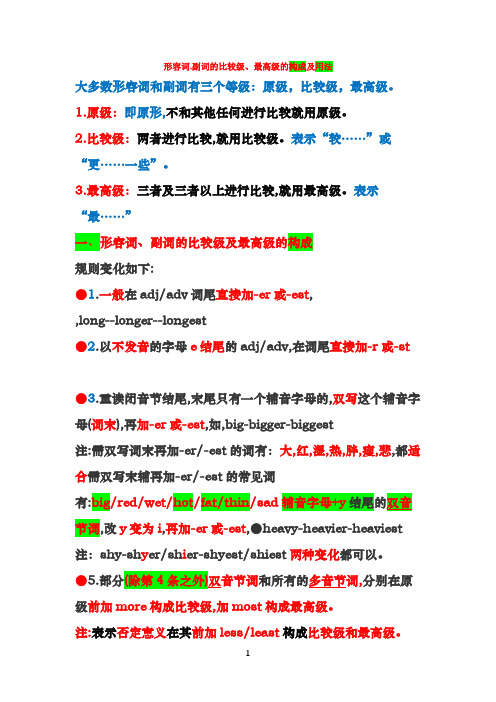
形容词,副词的比较级、最高级的构成及用法大多数形容词和副词有三个等级:原级,比较级,最高级。
1.原级:即原形,不和其他任何进行比较就用原级。
2.比较级:两者进行比较,就用比较级。
表示“较……”或“更……一些”。
3.最高级:三者及三者以上进行比较,就用最高级。
表示“最……”一、形容词、副词的比较级及最高级的构成规则变化如下:●1.一般在adj/adv词尾直接加-er或-est,,long--longer--longest●2.以不发音的字母e结尾的adj/adv,在词尾直接加-r或-st●3.重读闭音节结尾,末尾只有一个辅音字母的,双写这个辅音字母(词末),再加-er或-est,如,big-bigger-biggest注:需双写词末再加-er/-est的词有:大,红,湿,热,胖,瘦,悲,都适合需双写末辅再加-er/-est的常见词有:big/red/wet/hot/fat/thin/sad辅音字母+y结尾的节词,改y变为i,再加-er或-est,●heavy-heavier-heaviest 注:shy-sh y er/sh i er-shyest/shiest两种变化都可以。
●5.和所有的多音节词,分别在原级前加more构成比较级,加most构成最高级。
注:表示否定意义在其前加less/least构成比较级和最高级。
important----less important----least important EnglishismoreinterestingthanChinese=Chineseislessinte restingthanEnglish.●6.由“形容词加-ly”构成的副词(除bad ly是不规则变化worse/worst),在其前加more/most构成比较级和最高级。
;但要注意:early不属于这一条。
early----earl i er----earliest●7.由“名词后加-ful”构成的形容词,都是在其前加more/most构成比较级和最高级。
- 1、下载文档前请自行甄别文档内容的完整性,平台不提供额外的编辑、内容补充、找答案等附加服务。
- 2、"仅部分预览"的文档,不可在线预览部分如存在完整性等问题,可反馈申请退款(可完整预览的文档不适用该条件!)。
- 3、如文档侵犯您的权益,请联系客服反馈,我们会尽快为您处理(人工客服工作时间:9:00-18:30)。
形容词、副词及其比较等级形容词1.形容词的语法功能形容词在句中主要做定语、表语、和补足语等。
(1)形容词做定语A warn smile is the universal language of kindness .温馨的笑容是友好的通用语言。
Character is the real foundation of all worthwhile success .性格是成功的真正基础。
(2)形容词作表语A good reputation is valuable .好的名声是宝贵的。
If we command our wealth ,we shall be rich ang free .如果我们能驾驭财富,我们将会富有和自在。
(3)形容词做补足语Knowledge makes one gentle ,while association makes one perfect .知识使人优雅,而交往使人完善。
Character must be kept bright .必须保持光明正大的品格。
2.形容词的比较级和最高级1)形容词的比较等级分三级原级比较级最高级dark darker darkest tall taller tallestusefull more usefull more usefull2) 形容词比较级和最高级的构成(1)规则变化单音节词和少数双音节词在词尾加 -er和–est ;多音节词和部分双音节词(2)不规则变化3.形容词各比较等级的常用句型1)原级进行比较同级比较句型:A+(be)+as+形容词+as+B .该句型表示“A和B一样。
”。
其否定形式为not as...as 或not so ..as ,表示“不如。
”。
A man can be as great as he wants to be .一个人可以变得和自己希望的一样伟大。
This knife is as that one .这把刀跟那把刀一样锋利。
What happens is not as important as how you react to what happens . 发生的事情不如你对此所作的反应重要。
Richard is not so tall as Tom 理查德没有汤姆高。
2)比较级进行比较(1)more...than表示“比。
更”,两个事物作比较,形容词用比较级,后接连词than,引出比较对象。
Wisdom is more precious than wealth.智慧比财富更重要。
Blood is thicker than water .血浓于水。
Health is certainly more valuable than money .健康当然比金钱更宝贵。
Imagination is more important than knowledge .想象力比知识更重要。
(2)no more ...than 表示“和。
一样不。
”,相当于not as ..。
as ,是同级的否定表达,后面还可以加名词或动词。
A home without love is no more a home than a body without a soul is a man .没有爱的家庭不能成为家庭,就像没有灵魂的躯体不能成为人一样。
I can no more thing than he can dance .我不会唱歌就像他不会跳舞一样。
(3)The more ...the more ...两个分句开头分别是定冠词+形容词比较级,表示“越。
越。
”。
The more you learn from the past,the fewer regrets you have .向过去学习的越多,悔恨就越少。
The greater your ability to understand is ,the better listener your will become.理解能力越强,你就越善于倾听。
The happier you are about yourself ang you life ,the healthier you will be .对自己和生活越满意,就越健康。
The sooner ,the better .越快越好。
2)最高级进行比较在表示三个或三个以上的人或事物进行比较时用如下句型:主语+连系动词+the +形容词最高级+(名词)+比较的范围。
He is the oldest of the three .他在我们三人中年龄最大。
He is the oldest in the class .他在我们班年龄最大。
He works hardest among us 他在我们之间工作最努力。
4.常用“形容词+介词+宾语”句型举例(1)主语+be+形容词+about+宾语用于本句型的常见形容词有:anxious ,certain ,concerned,excited,happy,nervous,Particular等。
Mary is very anxious about Tom’s health .玛丽非常挂念汤姆的身体健康状况。
I was very concerned about my mother’s illness.我很担心母亲的病。
The kids are so excited about Christmas.孩子们对过圣诞节都感到非常兴奋。
He is very particular about what he eats .他对吃的东西很挑剔。
(2)主语+be+形容词+at+宾语用于本句型的常见形容词有:amazed,angry ,annoyed,astonished,bad,clever,good,quick,ready,slow等。
Mary was amazed at what Tom had done .玛丽对汤姆的所作所为大为惊讶。
His brother is bad at maths .他弟弟的数学很差。
She is good at languages .她很精通语言。
(3)主语+be+形容词+for+宾语用于本句型的常见形容词有:adequate,anxious,appropriate,eager,famous,fit,good,late,necessary,proper,responsible,right,thirsty,vital等。
He is anxious for the prize.他渴望获奖。
France is famous for its fine food and wine.法国以佳肴和美酒闻名。
Who is responsible for breaking the mirror?这镜子是谁打破的?He was thirsty for power .他渴望获得权利。
(4)主语+be+形容词+from+宾语用于本句型的常见形容词有:absent,distant,diverse,free,remote,safe,secureSeparate等。
Two students are absent from class today .今天有两名学生缺课。
She is free from troubles .她无忧无虑。
The course is rather remote from ordinary life .这门课程离日常生活相当遥远。
(5)主语+be+形容词+in+宾语用于本句型的常见形容词有:absorbed,concerned,firm,interested,lacking,Lost,low,poor,rich,skillful,weak.strong等。
He was soon absorbed in his book .他很快就专心看书了。
He is concerned in the matter .他与这事有牵连。
I would be very interested in being involved in the plan .我对能参加这个计划十分感兴趣。
She is skillful in knitting .她擅长编制。
(6)主语+be+形容词+of+宾语用于本句型的常见形容词有:ashamed,aware,capable,careful,certain,characteristic,composed,confident,conscious,considerate,fond,greedy,ignorant,ignorantimpatient,independent,jealous,proud,worthy等。
Are you aware of the danger?你意识到危险了吗?He is confident of winning the next election .他有把握赢得下届大选。
We’re all quite fond of sightseeing.我们都非常喜欢游览。
Two points in this report are especially worthy of notice .这份报告中有两点特别值得注意。
(7)主语+be+形容词+to +宾语用于本句型的常见形容词有:accustomed,additional,alike,approximateattractive,beneficial,common,cool,devoted,equal,essential,fair,faithful,harmful,helpful,just,loyal,necessary,next,open,opposite,polite,prior,proportional,sensitive,similar,strange,thankful,helpful,just,loyal,necessarynext,open,opposite,polite,prior,proportional,sensitive,similar,strange,thankfulvital 等。
He is accustomed to walking with his wife after dinner .他已经习惯于晚餐后和妻子一起散步。
These measures should be beneficial to the economy .这些措施应该对经济有益。
I wish you’d be more polite to my friends .我希望你对我的朋友更礼貌一些。
We must be more sensitive to the needs of the young students .我们必须对青年学生的需求更加敏感。
